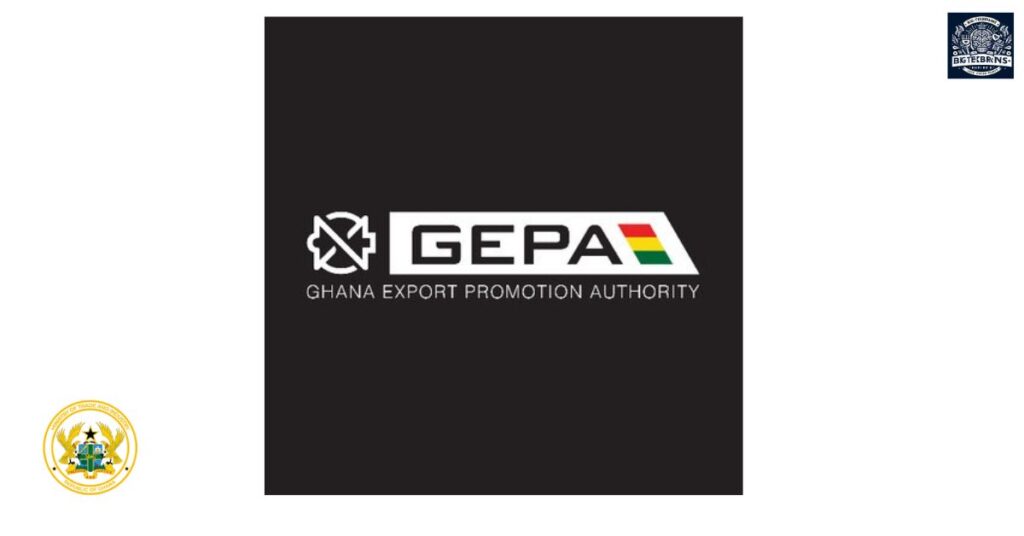Historical Overview
The Ghana Export Promotion Authority (GEPA) was established in 1969 through NLC Decree 396 with a mandate to develop and promote Ghana’s non-traditional exports (NTEs). Over the years, it has evolved into the main state institution responsible for export development and diversification.
Key historical milestones include:
1969:
- GEPA was created to focus on promoting non-traditional exports such as handicrafts, processed foods, and agricultural products.
1986:
- GEPA’s mandate was expanded to align with Ghana’s Economic Recovery Programme (ERP), emphasising export-led growth.
2013:
- The Ghana Export Development and Agricultural Investment Fund (EDAIF) Act strengthened GEPA’s funding and operations.
2016:
- GEPA was restructured under the Ghana Export Development Programme to focus more on value addition and market penetration.
Operations
GEPA’s primary goal is to increase the earnings from non-traditional exports by facilitating market access and capacity building for Ghanaian exporters. Key operations include:
Export Development:
- Offering exporters technical assistance, training, and funding to enhance product quality and competitiveness.
Market Research and Promotion:
- Identifying export markets, conducting research, and organizing trade fairs and exhibitions.
Export Policy Implementation:
- Collaborating with the government to implement policies that support export growth.
Product Development:
- Promoting value addition to raw materials to increase export revenue.
Trade Facilitation:
- Supporting exporters in navigating trade regulations and procedures.
Constitutional Backing
GEPA operates under the legislative framework provided by:
NLC Decree 396 (1969):
- Established the Authority as a statutory body.
Export and Investment Laws:
- For example, the EDAIF Act provides financial support for export development.
Trade and Industry Ministry:
- As a subsidiary agency, it aligns with constitutional directives on trade and industrialization.
Offices and Institutions Under GEPA
GEPA functions through regional and national offices, each tasked with specific responsibilities:
Headquarters (Accra):
- The central hub for administrative and policy functions.
Regional Offices:
- Located in major regions like Kumasi, Takoradi, and Tamale, providing localized support to exporters.
Trade Missions:
- GEPA collaborates with Ghana’s embassies and consulates globally to promote Ghanaian products abroad.
Leadership
GEPA is headed by a Chief Executive Officer (CEO) who oversees its operations. Leadership also includes:
Board of Directors:
- Provides strategic direction and governance.
Deputy CEOs:
- Focus on specific areas like export development and finance.
The Minister of Trade and Industry oversees GEPA’s activities, ensuring alignment with national trade policies.
Method of Appointments
Appointments at GEPA follow standard public service procedures:
- The CEO is appointed by the President of Ghana, in consultation with the Council of State.
- Other executives and staff are recruited through competitive public service processes.
Institutions That Work With GEPA
Several institutions collaborate with GEPA to fulfill its mandate:
Ghana Free Zones Authority (GFZA):
- Supports export-oriented businesses in free zones.
Customs Division of GRA:
- Facilitates export clearance and compliance.
Food and Drugs Authority (FDA):
- Ensures exported goods meet international standards.
Ghana Standards Authority (GSA):
- Provides certification for goods.
Ministry of Trade and Industry:
- Oversees GEPA’s alignment with national trade objectives.
GEPA has been active in expanding markets for Ghanaian exports, particularly in Asia, Europe, and Africa, under the African Continental Free Trade Area (AfCFTA) initiative.
How They Function
Engaging Stakeholders:
- Collaborates with producers, exporters, and policymakers.
Capacity Building:
- Trains exporters to meet international standards.
Market Linkages:
- Facilitates partnerships between local producers and international buyers.
Policy Advocacy:
- Works with the government to create export-friendly policies.
Overseers
GEPA is supervised by the Ministry of Trade and Industry. Additionally, Parliament provides oversight to ensure accountability and transparency in its operations.
References:
- Ghana Export Promotion Authority Official Website: https://www.gepaghana.org
- “Export-Led Growth in Ghana” – Ghana Trade Policy Review, 2018.
- EDAIF Act and NLC Decree 396 – Ghana’s Legislative Instruments on Trade and Investment.
- Ministry of Trade and Industry Reports – https://moti.gov.gh.

